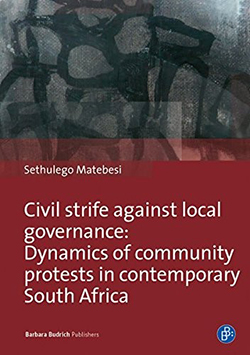Latest News Archive
Please select Category, Year, and then Month to display items
22 May 2020
|
Story Nitha Ramnath
![]()
A Virtual celebration of Africa Month
On 25 May 2020, Africa will celebrate the 57th anniversary of the founding of the Organisation of African Unity. A central tenet of the organisation, which was the predecessor of the African Union, is African solidarity. Member states undertook to coordinate and intensify their cooperation and efforts to achieve a better life for the people of Africa. The University of the Free State (UFS) has a long tradition of commemorating Africa Day and the ideas underpinning it. Every year, diverse events aimed at advancing African unity and solidarity take place during Africa Month – traditionally, the highlight is the Africa Day Memorial Lecture hosted by the University's Centre for Gender and Africa Studies.
This year, celebrating African unity through significant events involving the physical presence of a large number of people, will likely be impossible. COVID-19 is ravaging the world and Africa may become one of the world regions worst affected by the consequences of the virus. Social distancing may be difficult to achieve in a continent with densely populated urban centres that often feature large informal settlements. Besides, the economies of African nations are not as robust as those of other world regions. The challenge that Africa is facing, appears to be one that can only be mastered by its people acting in solidarity and unity. The continent has already developed an Africa Joint Continental Strategy for COVID-19 Outbreak to combat the virus, and an Africa Taskforce for Coronavirus has been established. The ideas of African togetherness and the underpinning philosophy of Ubuntu may be critical for strengthening African solidarity at a time when it may be more relevant than ever.
The commemoration of Africa Day takes a different theme each year. This year, the UFS 2020 Africa Month celebrations will take a virtual format, with the theme of ‘Africa together forever’ underpinned by the COVID-19 global pandemic. The theme is particularly significant considering the context of the African continent; and only through the demonstration of solidarity and unity can Africa overcome the challenges of the global pandemic.
The University will host a variety of cultural and intellectual contributions on the dedicated UFS virtual Africa Month website. On Africa Day (25 May 2020), a virtual Africa Day function, which will be posted on the website, will conclude the Africa Month commemorations.
The diverse contributions to the 2020 virtual Africa Month activities will highlight the University’s commitment towards creating a diverse, challenging intellectual environment. The UFS strives as a research-led university, to provide an environment in which new ideas are incubated and debated; contributing towards its transformation process and African unity.
Valour inspires book on community protests
2016-10-18

The cover of Dr Sethulego Matebesi’s
book, Civil strife against local governance:
Dynamics of community protests in
contemporary South Africa, that will be
released on 1 November 2016.
Photo: Supplied
Two significant political events: the murder of an unarmed protester, and school children forced out of school sparked the idea to write a book on community protests.
The book, Civil strife against local governance: Dynamics of community protests in contemporary South Africa, by Dr Sethulego Matebesi, gives an academic account of service delivery protests in South Africa.
Research address protests in different communities
“The focus of my book is on community protests directed against municipalities in both predominantly black and white communities,” Dr Matebesi, senior lecturer in the Department of Sociology at the University of the Free State, said. The funding for the book was received from the National Research Foundation and the Erasmus Mundus EU-Saturn Scholarship.
Informs literature on service delivery protests
The struggle against municipalities reaches across geographic and demographic boundaries, but the violent turn of protests in black communities in contrast to white communities has become somewhat of a hegemonic account by scholars. “The book connects the critical issue of community protests with the equally precarious issue of political trust in local government,” Dr Matebesi said. Case studies in the book are indicative of significant shifts in community protest – thus making it timely. Dr Matebesi said: “The book informs the growing literature on community protests and also fills an empirical void by including protesters in residents’ associations.”
“The book is a personal milestone and
the single greatest return on the
sacrifices made over the past 4 years.”
Personal milestone worth the sacrifice
Research was conducted between 2012 and 2015, whereby two case study sites were selected in four provinces to account the different tactics used. “The book is a personal milestone and the single greatest return on the sacrifices made over the past four years,” Dr Matebesi said.